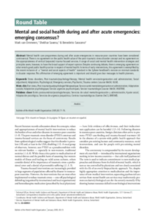Mental health care programmes during and after acute emergencies in resource-poor countries have been considered controversial. There is no agreement on the public health value of the post-traumatic stress disorder concept and no agreement on the appropriateness of vertical (separate) trauma-focused services. A range of social and mental health intervention strategies and principles, seem, however, to have the broad support of expert opinion. Despite continuing debate, there is emerging agreement on what entails good public health practice in respect of mental health. In terms of early interventions, this agreement is exemplified by the recent inclusion of a “mental and social aspects of health” standard in the Sphere handbook’s revision on minimal standards in disaster response. This affirmation of emerging agreement is important and should give clear messages to health planners.
This paper argues that distinct intervention strategies should be considered for the acute emergency and post-emergency phases. Also, it aims to achieve a conceptual distinction between social and mental health interventions. Many of the strategies described here may be common sense, but by making them explicit in documents and policy statements they become a powerful tool for programme planning and evaluation. These principles and strategies have been developed for resource-poor countries — where the vast majority of disasters arise — but they are also considered appropriate for high-income countries.
©World Health Organization

